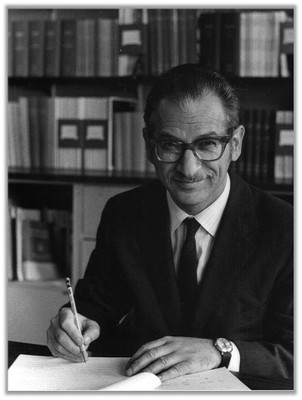Gang Research at ASU
about Walter B. Miller
Walter Miller's work focused on how relationships and culture impact daily activities. Born in Philadelphia in 1920, Miller attended the University of Chicago, where he was a member of Phi Beta Kappa, and Harvard. He was defined not only by his approach to gangs – members as mere youth engaging in the normal behaviors of their communities – but by his prolific involvement with government agencies and public service.
Miller served as a member of committees for the Department of Labor and the Department of Justice and as a research consultant on projects by the National Education Association and various U.S. cities. He was truly a scholar, working with such academics as John Q. Wilson and Daniel Patrick Moynihan. While notable for his study of gangs, Miller was also involved in the areas of crime prevention through environmental design (CPTED), youth delinquency and poverty studies. He played a mean trumpet, and used his musical prowess as a way to break down barriers of income, race/ethnicity and culture between himself and many of the gang youth with whom he worked.
He served as a lecturer and researcher at various institutions, including: Harvard, Brandeis University, Boston University and Massachusetts Institute of Technology. Beginning in the mid 1970s, Miller directed the National Youth Gang Survey. Later, with the Office of Juvenile Justice and Delinquency Prevention, he worked closely with the National Youth Gang Center. This brought his work full circle, evolving from his days with the Special Youth Program in the early 1960s and “the generating milieu” in a single city to a national strategy in exploring gang membership. It should not come as any shock, given his education and the peers with whom he worked, Miller focused on relationships. Drawing on the rich tradition of social science at Harvard (Sheldon and Eleanor Glueck, William Foote Whyte) and the history of Boston, Miller brought these relationships to life in a manner few have achieved.
City Gangs
City Gangs is Walter Miller's unpublished masterpiece. Based on three years of field work with gang youth in Roxbury, Miller expands on the core themes of culture, family and group cohesiveness. He describes in great detail the role of delinquent and non-delinquent activities in the lives of the young men and women in the seven gangs he studied. The book occupies an important place in our understanding of youth programming, communities, families and gangs.
**Work is not to be reproduced without expressed written permission
